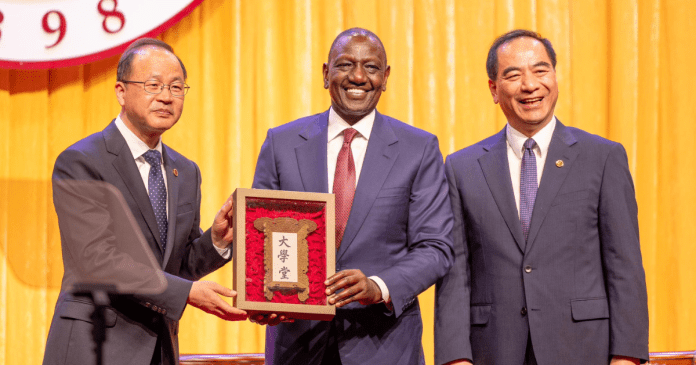President William Ruto has explained why goods and services from Kenya struggle to compete with those from neighboring Tanzania and Uganda, citing differences in international trade classifications that grant Kenya’s neighbors duty-free access to markets.
Kenya’s middle-income status affects trade
“Let me explain why people sometimes find it easier to go to Uganda or Tanzania for goods and services. This is precisely the problem I aim to solve by signing the bilateral labor agreement.”
Speaking during a meeting with Kenyans living and working in China, the president responded to concerns raised by a Kenyan entrepreneur who lamented the high taxes imposed on Kenyan exports, which make them less competitive compared to similar products from neighboring countries.
Video
US Embassy announces opportunities for Kiswahili teachers to teach in the US
Ruto attributed the disparity to the income classification of the respective countries.
“The difference between Kenya and our neighbors is that Kenya falls into the middle-income category, while Tanzania, Uganda, and other neighboring countries are classified as Least Developed Countries (LDCs). Because of this, they export duty-free, whereas Kenya’s exports are subject to duties,” he said.
The president revealed that Kenya is now seeking to level the playing field by pursuing a preferential trade agreement that would eliminate tariffs on its exports. “We want to negotiate an agreement—a preferential trade agreement—that will place Kenya on equal footing with its neighbors,” he said. “The challenges you’re facing today are exactly what we seek to address.”
He added that the classification of Kenya as a middle-income country has hindered its global competitiveness.
“Kenya is currently categorized differently from other countries, and that classification impacts our trade conditions. This is the reason for our discussions, and it is why we are signing the economic framework tomorrow.”
The framework, he noted, will open the door to trade negotiations aimed at scrapping duties and levies on Kenyan products.
“Through this framework, we will have the opportunity to negotiate a preferential trade agreement that removes the duties and levies currently imposed on Kenyan products being exported to this country,” Ruto added.
Ruto signs major investment pacts in China
Ruto is in China on an official state visit, where he has inked several investment deals, including a KSh 107 billion agreement expected to boost Kenya’s agriculture, manufacturing, and tourism sectors.
“We will strengthen co-operation with China to confront our challenges and push for our shared success. In particular, we will upgrade our infrastructure to promote connectivity, hence facilitate trade in Kenya and within the region,” Ruto told the diaspora audience.
He commended China’s Belt and Road Initiative, saying it had significantly advanced infrastructure development across Kenya and Africa.
How fight with American wife landed Abduba Dida in US jail
During his meeting with Chinese Premier Li Qiang, Ruto said both countries agreed to fast-track a free trade agreement.
“We also commit to the speedy conclusion of a free trade agreement between our two countries,” he said.
Ruto’s remarks come against the backdrop of escalating trade tensions between China and the United States.
The Donald Trump administration recently imposed a 145% tariff on Chinese imports, prompting a swift response from Beijing, which slapped a 125% tariff on American goods.
The tariff standoff has rattled global markets, with the BBC reporting that China has returned Boeing aircraft due for delivery to the U.S. in protest.









